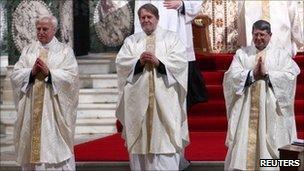Dissident Anglicans leave Church of England
- Published

Three former Anglican bishops were ordained as Catholic priests on 15 January
A first wave of about 600 Anglicans are officially leaving the Church of England in protest at the decision to ordain women as bishops.
They will be enrolled as candidates to join a new branch of the Catholic Church - the Ordinariate - which has been specially created for them.
They attended Catholic Mass marking Ash Wednesday before spending Lent preparing to convert.
The Ordinariate is led by three former Anglican bishops.
The group leaving the Church of England - which includes 20 members of the clergy - are unhappy about developments in Anglicanism they claim have led it away from traditions historically shared with Roman Catholics.
'Goalposts shifted'
Father Ed Tomlinson, who has stood down as a parish priest in Tunbridge Wells, Kent, said the Anglican Church had been "shifting the goalposts".
"We couldn't continue to be Christians in a normal sense when we were in a maverick Church that kept changing the rules to appease the common culture," he said.
He said changes to the rules on divorce and family had produced a "political Church where people campaign for things".
Parishioner Kay Abbey, who is leaving her church in Hockley, Essex, said the ordination of women bishops was the final straw.
"It just gets totally away from what we've been taught in the Bible that it comes through Jesus, through the male line," she told the BBC.
"The Catholic tradition gives us that and that's the way I want to continue to go."
Father Ed Tomlinson: Church is changing from 'a house of faith into a mock parliament'
The converts' first formal step on their journey towards becoming a Catholic - the rite of election service - will take place in churches this weekend.
Then after several weeks of preparation, they will become Catholics just before Easter and will then join the Ordinariate, which was set up by Pope Benedict specifically for former Anglicans.
It is led by three former Anglican bishops - Andrew Burnham, Keith Newton and John Broadhurst - who themselves converted earlier this year.
The Ordinariate will be funded initially by donations but its priests will not receive a salary, as they did in the Anglican Church.
'Spaghetti junction'
The BBC's religious affairs correspondent Robert Pigott said the numbers represent only a tiny proportion of the Church of England's clergy and membership, and are smaller than earlier estimates.
But he said other clergy on the traditionalist wing were waiting to see what provisions would be made to allow them to escape oversight by women bishops in the future before deciding whether to follow suit.
Church of England spokesman Steve Jenkins said that "movement between Churches is like a spaghetti junction".
He said that official figures showed 14 Roman Catholic priests had converted to the Church of England in the past five years.
The Catholic Church has described the establishment of the Ordinariate as "a unique and historic moment".
Archbishop Vincent Nichols, the Catholic Church's leader in England and Wales, said: "It is to contribute to the wider goal of visible unity between our two Churches by helping us to know in practice how our patrimonies of faith and living can strengthen each other in our mission today."
- Published17 January 2011
- Published15 January 2011
- Published15 January 2011